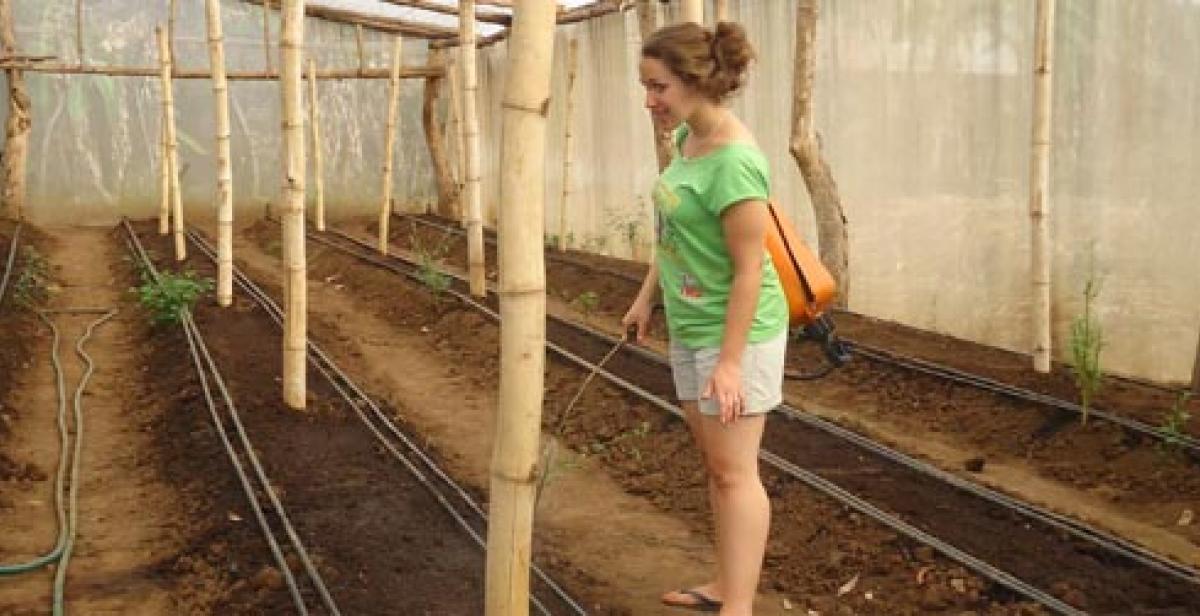On Monday 6th February we visited the mayor of El Refugio, a municipality in Ahuachapán. We learnt from him what policies the council has in regards to women’s rights and how he is helping the local bakery, La Esperanza, which is run by women who live close by in the community. We even managed to get the mayor to give a computer to the bakery so that they can have more accurate finances and plan their marketing strategy. Whilst it might seem like something small, it was one of the women’s priorities for the future when we first came into contact with them. This was a really great outcome and the women were very grateful for Luke’s perseverance on this topic.
We spent three days working in the greenhouse this week where we were preparing more soil banks and spraying natural pesticide on them. The pesticide is called M5 because it is made out of five natural products including onion, chilli, garlic and ginger. We also began planting tomatoes and lettuces. This was quite fun even if it was uncomfortable because of the heat in the greenhouse!
Working in the greenhouse has been a mind opening experience. It is great to see the benefits that it brings to the women of Amiga, and we have seen the financial impact it has on them as people. However, they would not have any of the benefits if it was not for their tremendous amounts of hard work and positive attitudes. Sara, the woman responsible for the work in the greenhouse, often awakens at 5 or 6am and works until midday. More often than not she will return in the afternoon to attend to the crops.
On Saturday we conducted our own sexual health workshop in the community of El Tigre. The workshop was for 12 people and they were aged between 15 and 27. Some of the young people taking part had been trained in sexual health workshops so we were interested to see how they would respond to our activities. We started off with a short game to break the ice and then we asked five facts which they had to decide whether they thought they were ‘verdadero’ (true) or ‘falso’. This was interesting and hopefully taught them a few facts that they might not have been aware of in relation to sexual health. After this we performed a short drama on a situation related to sexual health issues. They seemed to enjoy it.
We then split them into four groups and gave them a similar situation. Afterwards the group had to devise their own drama from this to represent how they would respond to the situation. They all took to the task with enthusiasm and created very good dramas. We were all very impressed with the acting skills in the group as well, very believable! After the dramas everyone said one thing that they had learnt from the workshop and we were pleased with the responses. We had really good feedback from all the participants and those who were already trained said they were going to start using dramas in their workshops, as a way of getting the young people to think about these situations.
Monday and Tuesday of this week was spent in San Salvador with the other ICS Progressio volunteer group doing a review of what we have done so far. It just meant that we could evaluate the progress we have made and consider changes that could be made to make our work more impactful and practical, so we could really see the benefits of the programme and the work we are doing. It was useful to discuss this as a team and reflect on the work so far.
On Thursday there was a food fair in Ahuachapán and lots of women from AMIGA were there selling chickens, fruit and vegetables which they had grown in the greenhouse. We helped the women on the stalls and watched them sell their products. It was great to engage with the women from a different side of the spectrum, watching them make money for their labour. Sarah managed to make $40 from chickens, cucumbers and potted vegetable plants. They all had a very successful day and sold most of their produce. Later on in the week, we planted some more lettuce plants in the greenhouse and helped de-root the cucumber plants. Sarah told us that if they had another greenhouse they would be able to keep the fully grown plant and cultivate it further, but as they have been growing since November, they produce fewer products and are no longer as cost effective as another crop. We will be helping them replace this empty space with chilli.
ICS volunteer Tamara Short writes from El Salvador, where her group is volunteering with the women's organisation IMU. Photo: ICS volunteer Laura Packer spraying organic insecticide on the soil in the greenhouse before the planting of tomatoes.



